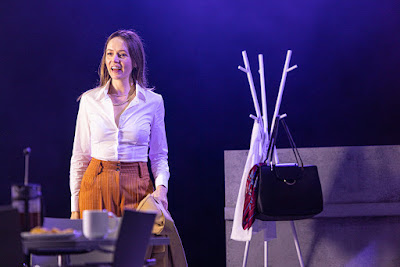Of course, that’s an ideal scenario that hasn’t been open to most of us for the last 18 months.
Even before then, I remember some years ago sitting up in the gods peering down at the Grand Opera House stage to see a touring production of The Curious Incident of the Dog in the Night-Time. While the vantage point offered a bird’s eye view of the full set and choreography, it was impossible to distinguish subtle facial expressions and any sense of emotion had to be gleaned from larger gestures, how an actor carried themselves, or through their tone of voice.
Pre-pandemic, I was semi-regular at National Theatre Live productions in local cinemas, where a wide-angled view of the full set (conveniently a large cinema screen isn’t far off the height from stage to proscenium arch) could alternate with close-ups of significant interactions. Something was nearly always lost in the action – the ability to turn your head and be distracted by some small detail happening in another corner of the stage was denied – but it was a good second best to travelling across to London to see something in person. And the Apple TV filmed adaptation of Hamilton probably improved the staging of the all-singing all-dancing theatre version.
Amanda Verlaque’s Distortion homes in on an ambitious political couple. A public relations guru Jo (Valene Kane) has been employed to increase their electoral success. Heather (Mary Moulds) is aiming at a seat on Belfast City Council, while Kevin (Michael Condron) has his eyes set on representing Belfast South at Westminster. As their preparation and campaign unfolds over 80 minutes, Verlaque’s writing sets up a regular rhythm of revelation, audience re-evaluation, and then follows through into the triangular reaction among the central cast.
The evolving power dynamic and never-settling question of who is playing with whom is engaging, sprinkled with the hypocrisy and duplicitousness expected in a political thriller. Where these three are concerned, it’s no spoiler to say that ultimately the player turns out to have been played. Enough secrets are spilled to fill more than one closet.While one character is challenged “Don’t you want to be true to yourself?” it’s not clear that any of the individuals are comfortable owning up to their circumstances, motivations and behaviours. Where politics goes, sex tends to follow. As each layer is peeled off, the intrigue grows and the plot moves beyond a simple stereotyped representation of local Northern Ireland politics and into a morality tale that asks questions of how we view honesty, coercion, sexuality and control. And how what we believe and do and say can be distorted by ourselves and others.
Lata Sharma has a recurring role as political reporter Jane. Her lines are a bit too verbose, but her struggle to get to the truth of the story is real enough. Condron is doesn’t overplay the cheeky chappie card and excels as a canny opportunist, while Moulds successfully pivots her closeted character from being warm and earthy to expressing powerful lust as the plot unfolds. Kane wears Jo’s lesbian heart on her sleeve and really captures the strategist’s distressing loss of control.
Ciaran Bagnall’s set picks up a lot of the textures and hues of The MAC’s galleries. The faux concrete and low unfussy walls provide a great canvass on which director Rhiann Jeffrey can paint her characters.
Filmed on the The MAC’s main stage – and premiered as a film to a small audience sitting in the same theatre space, terribly meta! – you’re never not aware that this is a MAC production, yet Distortion never tries to stop being theatre and become TV.
Jeffrey often takes advantage of the camera angles to keep the three protagonists in shot, lining them up in a chain, or creating a visual triangle that allows the audience to track their reactions. The shots that work least well are the handful of full-face close ups which are too televisual and jar. But on the whole, the curation of vantage points enhances the feeling of drama and benefits the storytelling.
Garth McConaghie’s sound design picks up on the title, makes good use of the stereo imaging, and isn’t afraid to fade into the background at the points when the dialogue has no need to any external augmentation.
With only a few nips and tucks, Distortion – originally written for stage – could return to the MAC as a full theatre piece. I really hope it does, as it’s one of the smartest pieces of political drama to come out of Northern Ireland in the last five years.
Distortion can be viewed on demand (£12.50–25 pay what you can) until Sunday 24 October
Photo credits: Melissa Gordon
Enjoyed this review? Why click on the Buy Me a Tea button!


No comments:
Post a Comment